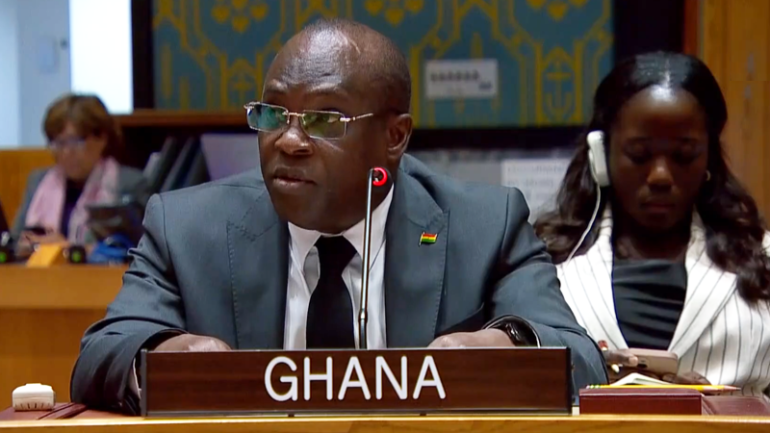UNSC Meeting on Prevention of Violations against children in Armed Conflict

Ambassador Harold Agyeman
Ghana’s Representative to the United Nations
New York, New York
July 05, 2023
Madam President,
Let me begin by congratulating you and the United Kingdom on your assumption of the Presidency of the Security Council for the month of July. I also express Ghana’s appreciation and thanks to Ambassador Lana Nusseibah for the UAE’s exceptional leadership of the Council during the month of June. As the Council considers further measures it can take to advance the
protection of children in armed conflict, we should be compelled to do more. Across all conflict situations, our children are not in a good place and have been forced to grapple with immense physical and mental challenges that they do not have the capacity to address or even process. Ghana therefore commends the United Kingdom for convening this open debate on Children and Armed Conflict. We thank SRSG Virginia Gamba for her briefing and Mr. Omar Abdi and Ms. Violeta for their additional perspectives. The words and grave stories that have been shared with the
Council today should lead us to act on our commitments and promises for the benefit of the world’s children.
Madam President,
Ghana remains deeply concerned by the atrocious violations and attacks that children growing up in conflict communities continue to suffer at the hands of armed groups and actors who have chosen to exploit the social disorder and power vacuums to purvey their unimaginable horrors. Killing and maiming children, putting children in the crosshairs of conflict, and using them as
weapons of war are unacceptable and rob them of their future. While the opportunities to bring about positive changes have often not been accepted by parties to conflicts, Ghana is encouraged by the outcomes that the Office of the SRSG on Children and Armed Conflict, UNICEF, and other partners have managed to achieve. We encourage the SRSG’s continuing engagement with parties to conflict, regional organizations, civil society organisations and UN actors, which have led to successful outcomes including the development and implementation of relevant protocols and action plans in Burkina Faso, Nigeria, and Yemen, among others. The past outcomes inspire hope and in furtherance of the objective to strengthen the regime for the protection of children in armed conflict, we would like to share four (4) key messages.
First, we call on the Secretary-General to facilitate a more systematic reporting to the Security Council on early warning indicators of potential violations and abuses against children. Child protection and the prevention of violations can be truly successful if risk factors that lead to grave violations against children are identified and adequately addressed before and during
conflict. An example of a major risk area that can be focused on and addressed is the impact of socio-economic factors such as poverty and lack of educational opportunities which increases the susceptibility of children to recruitment and re-recruitment by armed groups and sexual violence, among other violations. Peacekeeping missions by the United Nations and regional organisations
should seek to incorporate child protection obligations into mission planning, policies, decisions, and activities and must include child protection focal points in field operations. In this regard, we salute the African Union’s efforts to mainstream child protection into its institutional responses through the launch of the Policy on Child Protection in African Union Peace Support Operations and the Policy on Mainstreaming Child Protection into the African Peace and Security Architecture.
Secondly, given the cross-border nature of some violations against children in armed conflict, there is the need for enhanced cooperation between the United Nations and regional organizations, as well as with Member States, through the development and implementation of joint strategies and coordination mechanisms to prevent cross border recruitments and use, as well as trafficking.
Thirdly, we urge regional organisations to deepen their collaboration with civil society organisations in the areas of early warning and early response with a tailored focus on child protection. Platforms such as the ECOWAS Peace and Security-CSO Platform, if strengthened, can help to better detect, and predict threats to peace and security in West Africa and their effects on children. For this reason, we encourage ECOWAS in its partnership with West Africa’s network of CSOs to foster the sharing of information and experiences geared towards more effective conflict prevention and child protection.
Lastly, an indication of the level of importance we attach to the Children in Armed Conflict agenda is reflected by the resources we are willing to devote in support of its implementation. We therefore urge the Council’s full support for the allocation of targeted, practical and rapid resources to facilitate responses to threats against children. Moreover, there is the need for targeted
resources and urgent collaborative efforts by the international community and Member States to sensitise communities on explosive ordnance risks as well as to ensure the identification, fencing off and eventual destruction of all manner of explosive ordnances, which endanger the lives of children.
In concluding, I would like to reiterate Ghana’s commitment to the work of the Working Group on Children and Armed Conflict as well as to international frameworks such as theConvention on the Rights of the Child, the Paris and Vancouver Principles, as well as the Safe Schools Declaration. While significant strides have been made globally in raising awareness and preventing grave violations against children in armed conflict, the miles leftto travel is still long. Ghana is committed to travelling the extra mile for the cause of protecting our children and securing their safe and sustainable future. We all have a responsibility to ensure that no child must worry about where the next meal will come from or be traumatised by which direction the next bullet will be fired from.
I thank you.
